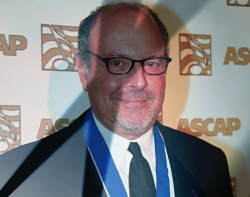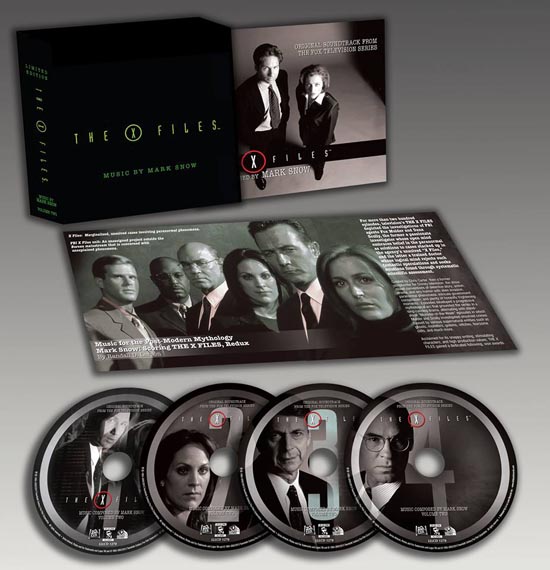Feb-23-2009
BeyondTheSea.it
Mark Snow speaks to ‘Beyond the Sea’
[Original article here]

Mark Snow doesn’t need any introduction. For all the X-Files fans, he is just the man who wrote the extremely famous TV show theme and who emphasized all the Mulder and Scully’s stories with his music, from the Pilot to the “I Want To Believe” movie.
When you think to “Existence” finale, don’t you hear the “Scully’s Theme” in your mind? Speaking about one of the last pieces, how many of you were moved by the “Home Again” theme in the “I Want To Believe” last scene?
From the first arrangements created using a synthesizer and samples to the classic orchestras and live instruments, the pieces and the genius of this composer were an extra values for X-Files since the beginning.
X-Files, Millennium, The Lone Gunmen and Harsh Realm. All these TV shows created by Chris Carter have the voice of Mark Snow and it was just one year ago when Frank Spotnitz officially announced, at the WonderCon, that the second X-Files movie would have had the same voice again.
Mark Snow kindly answered some questions we made him and he told us about his work for X-Files. He talked about the pieces he made for the TV show, the music he composed for both the movies, and how it felt like to write once again for a new chapter of this incredible story after a very long time. These are just some of the issues we talked about. Besides, he revealed us that a 4 CD boxed set of the X-Files TV music from the TV shows only will be released this spring.
Many moments of the show are still vivid in all fans mind thanks to the music, for example the “Scully’s Theme” that plays during the pregnancy story arc. In order to get to orchestrate music like this, do you get inspiration from pictures or is that a separated creative process?
I was inspired for “Scully’s Theme” from the incredible emotion of the story. I actually felt like part of Scully’s family, and it was almost a religious experience for me, and how great that I was able to use a live singer!
The “Teaser” from “Trust no 1” episode, which music is based on works such as Tchaikovsky’s “Barcarolle”, or also “We Wanted To Believe” from “Little Green Men”, based on Bach’s “Brandenburg Concerto No. 2 in F”, are just a couple of examples where classic music, joined with some of the X-Files characters voices, creates a style that perfectly fits with the show. Why did you choose to use classic music for the score?
Those classical pieces that we used, I chose them because they just seemed so right, and as a former classical musician, I had a lot of classical repertoire “spinning” around in my head. That Brandenburg Ct. #2, is a piece that I use to play as a student at Juilliard, as an oboist. So, working on those shows was especially great because I was able to delve into my past life.

In many pieces from “The Truth and The Light” you used the music with the insert of some voices from the X-Files dialogues (Mulder, Scully, Deep Throat) that made these pieces unique and original. How did the idea to use this approach come to you?
The idea of using the dialogue from the shows in the “Truth and the Light” CD, came from my music editor Jeff Charbonneau, who thought it would be very original to do this, and in a way, to make it sound like a radio show, that without watching it on TV, it really got you into the moment of the experience.
Sometimes in X-Files we can listen to very famous music like, for example, Cher’s or Moby’s. How was this music chosen? Have you had to adapt them to the show?
The Cher piece as well as Moby, was chosen by Chris Carter, who thought they would be especially effective. I think he was right. I also know that at the time, Chris was a big fan of Moby’s, and when I did the theme for Harsh Realm, he requested that I do something like Moby.
How did you feel to go back to write music for X-Files after many years? Have you tried to get back again to the old ‘classic’ X-Files style or did you just watch the movie and then began to orchestrate the soundtrack?
It was very easy and exciting to do the film score, especially being able to use the full orchestra and the singer. The music did not sound so good in the movie because it was mixed too low, but at least on the CD it sounded good, I hope you enjoyed it.
Has Chris Carter, or someone else, given you some input about the “I Want To Believe” music?
For “I Want To Believe”, Chris asked me to compile a CD of some of my favorite film music, and /or any music that I thought might have the right mood for his movie. He seemed to like what I chose, and it helped me to come up with a sound for the movie.
Were there any differences to orchestrate “Fight the Future” and “I Want to Believe”?
I thought that “Fight the Future” was much more of a traditional score then “I Want To Believe”. “I Want To Believe”, was I think more modern, and reflected more the sounds that are current now. The “Fight The Future” score was more heavily dependent on electronics and samples.
Is there any difference in writing music for a movie and for a tv show?
Writing for a movie you usually get more time, and have a much bigger pallette to work with. The modern film score today is made up of huge orchestra’s and tons of samples. In fact in “Bat Man: The Dark Knight” Hans Zimmer used 1000 tracks of music in his score, sampled orchestra , live orchestra, electronics, and anything that can make a noise!!

I think “Home Again” and “The Surgery” are very emotional and moving. Compared with the rest of the soundtrack, they have a sort of more positive “breath”, they are bright, less oppressive, less dark… less X-Files, maybe just to point out the new style Chris Carter gave to X-Files in the movie. What do you think about that?
Those are some of my favorite pieces that I ever wrote. The idea of writing beautiful melodic music in X-Files land, is really great. Yes, Chris wanted these emotional pieces in the movie and made it a point to make sure these were included. Thank you for noticing.
Is there a music you wrote for X-Files that after many years it’s still your favorite one?
That’s easy. “Surgery” and “Home Again”. (also, “Post Modern Prometheus”, “Beyond the Sea”, “Scully’s Theme”, hard question to answer)
The X-Files Theme is famous all over the world and people can connect it immediately to the show. Was there a moment in which you understood that your music contributed to create the X-Files phenomenon?
I didn’t think that my music and the theme were that great until after show #6, people started talking about it, and people were telling me how great the music was. All that music I wrote for the show, came so easily for me, that it was such a gift to have it be so successful, and I doubt that it will ever happen, a miracle!
Frank Spotnitz told in his blog that some of your X-Files works will be released in a new album. Could you say us something about that?
In this spring, La La Land records will release a 4 CD boxed set of the X-Files music from the TV shows only. It will have all the shows that I have been nominated for plus probably pieces from episode, I’m sure some of your favorites will be included.
Our huge thanks to Mark Snow for the helpfulness and niceness he showed us upon this occasion.
Last, but not the least, a special thanks to two users of ours, Virgil and Bittersweet, who made all this possible through their “behind the scenes” work.









